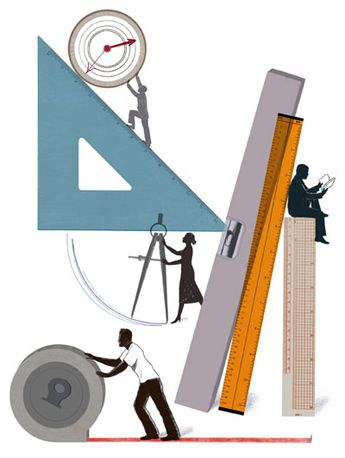
I do my taxes old school. I sit at my desk with a pencil and a piece of scratch paper, paper forms and the IRS and state booklets as my guide. It usually takes me under an hour to finish both filings. I review them one last time the following day and post them with the good old USPS. It’s easy when you all of your income is listed on one W2 and all you have to write off is your mortgage interest and property taxes. I image it’s not so easy for self-employed contractors, many of whom have seen the pendulum swing from some of the best years the building market has ever seen to some of the worst.
With this in mind, I thought some of you might have tax tips to share with your fellow contractors. Because I wouldn’t dare give tax advice I’ll get the conversation started with these five tips from Grant Thornton International. You can read their complete “10 tax tips for the construction industry” here and post your advice in the comments box below. Also, take a look at our earlier post to take advantage of energy tax rebates for building projects.
1. Make the most of your net operating loss deduction. Recent tax legislation opens up opportunities for taxpayers of all sizes to choose an extended carryback period for net operating losses (NOLs). This provision allows contractors who have NOLs to choose a five-, four- or three-year carryback period (increased from the normal two-year rule) for NOLs incurred in a tax year beginning or ending in 2008 or 2009. Keep in mind, however, that only a single year can qualify for this enhanced carryback period. Taxpayers with NOLs in two or three qualifying years need additional analysis to maximize their cash refunds.
2. Take a hard look at bonus depreciation deductions. As an incentive for investment in equipment, taxpayers are allowed to deduct half of the cost of 2009 qualifying property in the first year of use, and then depreciate the remaining half of the asset over its normal useful life. For five-year equipment (the most common tax life for construction equipment), this allows a deduction of 60 percent of the asset’s cost in the first year of its life. For contractors in a tax-loss position, this deduction increases NOL carryback opportunities. However, pass-through entities such as S corporations or LLCs should be aware that significant individual income tax increases are possible, which may make depreciation deductions worth more in the future. Careful planning is required to make sure this deduction is right for you.
3. Consider future capital gains and dividend tax rate increases. Under current law, capital gains and qualified dividends are taxed at a favorable 15 percent federal income tax rate. This preferential treatment is scheduled to expire at the end of 2010 and individuals (absent a law change) will face higher taxes on these items in 2011. Taxpayers with significant capital gains transactions should work with tax advisers to analyze whether accelerating capital gains and dividends into 2010 is a prudent tax move.
4. Take full advantage of capital asset expensing deductions. Rules originally intended for small businesses were expanded significantly to allow contractors to expense up to $250,000 of 2009 fixed asset costs, provided less than $800,000 of assets were placed in service throughout the year. Unlike bonus depreciation, this applies to new or used assets. However, this deduction cannot be taken if a contractor is already in a tax-loss position.
5. Consider not deferring income. The traditional wisdom of deferring income for tax purposes deserves another look. With many government entities looking for increased tax revenues, new tax policies and rate increases are very possible. At the current time, individual taxpayers are a target. With tax increases scheduled for 2011, taxpayers would be well-advised to consider whether deferring taxable income is still the most cash-efficient option.
Fine Homebuilding Recommended Products
Fine Homebuilding receives a commission for items purchased through links on this site, including Amazon Associates and other affiliate advertising programs.

Affordable IR Camera

Handy Heat Gun

Reliable Crimp Connectors

"10 tax tips for the construction industry"



















View Comments
Too late now but log your miles. We all know you use your truck soley, 100%, honest injun, for business purposes. Wink Wink Nudge Nudge Say no more.
But if you ever have your wife run errands
Post office
Office Supply Stores
Lowes or Homer Depot
Any running she does for you or any running you do in her vehicle (or any other that you own) is deductible. Lets say you regularly take you wife on a shopping trip 2 hours away (lots of guys around here take their wife to St. louis for example). If you pick up business related things, tile, tools, office equipment, what ever, the whole trip mileage is business use of that vehicle. If home depot is 20 miles away and you go there and then go grocery shopping out to dinner and then a movie, its all still business mileage. get a log book in every vehicle.
For those of you claiming 100% business use of your vehicle, you better be able to prove you never use it for your own personal use. If the IRS comes snooping around and asks your neighbors if you have ever hauled anything for them or if they have ever seen you hauling furniture or you kids bikes, they will nail you. Just throw a log book in and document some level of personal use and you will audit proof yourself. 5%, 10% something. The IRS isn't stupid. They know families have to have two vehicles for personal use these days.
Don't think you are smart by giving your employees a 1099 instead of a W2. If you control what they do, how they do it, when they do it, where they do it and provide them many of the tools to do it, they are your employees and you need to withhold taxes including FICA and file your reports like everyone else. You get cuaght and they will hose you if not go after you for a little gray bar motel time. On top of that, you are hosing your employees becuase they have to pay both halves of the FICA tax. IT IS ILLEGAL. Period.
If you have a workshop at your house that you use for business and the utilities are common between the home and the shop, you can use a reasonable method to allocate some of your monthly utilities as business expense. If you are going to claim office in a home, better make sure its a defined space dedicated to just that. It can't double as your man cave and/or the kids play room or your mother in laws guest room. Get audited on it and they will bust you.
Most of all keep good records of every nickel you spend on the business. Take the time to separate out your Home Depot stuff on Sunday between your business and your personal. make them ring two different orders. Take your guys out to lunch for a reward? Talk business at the table, document it and take it as a expense. By doughnuts and coffee? Document the reason why. (Not that you were hungry) (reward for safe completion of frame) The trick is to document as many of the things you are spending money on anyway as being business expenses. So long as you have legitimate documentation such as above, its a business expense. Even a twelve pack on friday afternoon can be a business expense if you are talking business when drinking it...planning the next week, reviewing punchlists, reward. You just have to get anal about saving receipts and documenting right away the business reason you spent that money.
BTW, now that have beaten up on you to document everything, I am going to tell you just the opposite. If you know of a legit expense that you can't find a receipt for, take it. If you put on new tires bought a new table saw whatever it might be. Don't let you tax man tell you can't expense it without a receipt. Its just that if you do get audited, it will be up to the IRS agent to find that undocumented expense and be concerned enough about it to raise it as an issue. At that point it will become your issue to find some way to prove your expense. Many tools probably have a date of mfg. If it coincides with your year of expense. Pictures of that along with current price quotes may be enough to prove it. You may have to go back to a credit card company or a check to also provide proof. Many autoplaces record your date of purchase under your phone number for future warranty claims. There are ways to prove it SHOULD you get audited so don't throw out a legit expense just because you don't have a receipt. So long as it was legit and reasonable, the worst that could happen is they disallow it and you have to pay tax on just that expense plus some possible interest. They would likely wave a penalty unless they think you are lying about it.
Clothes need to be specific to your trade or business to be deductible. Jeans are not deductible unless you can show you buy some sort of the special extra tuff jeans seen in these threads. Steel toe boots obviously but also special roofers shoes. Carharts would probably fly. Mechanics gloves. Saftey sunglasses definitely.
If you are going to donate money anyway, why not do it as a business expense and reduce your Self employment tax. If you are going to give a $1000 to your church, why not do so in exchange for putting your business name on the bulletin?
Brian... you are moving too fast. Please re-read your post. Edit Edit Edit! (jeeze, never thought I would be reminding somebody at FH to edit!)
L